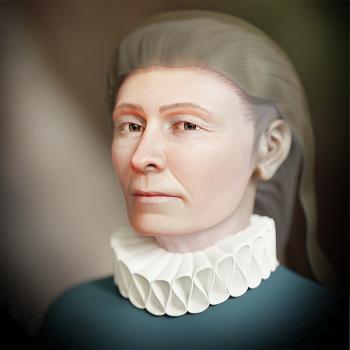Motivations matter when it comes to prayer, perhaps even more so than faith. In fact, if you're like me, much of your prayer is prayer for faith. Jesus warns against praying like pagans—idol-worshippers who babble on and on because they think they'll be heard if they say enough words. Granted, you have to talk a lot if you're trying to get a statue to do anything, but that pagans persisted indicates they had plenty of faith; it was just aimed in the wrong direction. By contrast, Jesus says, "your Father knows what you need before you ask." The implication is that weak faith and inadequate words will do. Moreover, presuming that God knows your needs even better than you do, a further implication is that God sometimes gives despite what you ask. To receive such undesired gifts from God requires that we trust God knows what he's doing, that like any loving Father, his concern is more for our ultimate well-being than for our immediate wishes.
Such faith goes to the matter of unanswered prayer. We all experience disappointment with God. Perhaps that's intentional. God did not come to earth as an impoverished, scandal-ridden, and finally executed carpenter to impress anybody. We become Christians only to suffer trouble and brokenness and end up dead on this earth. Talk about disappointment. But maybe God doesn't always answer prayer like you'd like because God wants you to want what He wants—on earth as it is in heaven. He wants you seeking after his Kingdom and after his righteousness. He wants you disappointed enough with this worldly existence so as to eagerly hope for your life to come.
Regrettably, promises of incomparable glory don't always make for sufficient motivation to follow Christ in the meantime. Which is why even the most heartfelt Christians mix their motives. We give to the poor because God gives to us, but also to assuage our guilt and because helping other people makes us feel good about ourselves and gets us a few props. We fast to hone our spiritual attention, but if that doesn't work at least we lose some weight. Prayer, however, doesn't offer the same sort of side benefits. This isn't to say that our motives can't be mixed when it comes to prayer, particularly when it comes to what we pray for. There are those who compare prayer to yoga or meditation to make it seem more normal, but do it out loud and in public and I guarantee most people will think you've lost your mind. I think this is part of prayer's design. As holy language reserved for God, there is a sort of human foolishness about it.
Ignatius of Loyola was born in 1491 into Spanish nobility. Europe of the late 15th century was a world of discovery and invention. Explorers sailed west to the Americas and south to Africa. Scholars uncovered the buried civilizations of Greece and Rome. The printing press fed a new hunger for knowledge among a growing middle class. It was the end of chivalry and the rise of a new humanism. It was a time of radical change, social upheaval, and war. The latter opened up career opportunities for Ignatius. The youngest of thirteen, all the other jobs had been taken. So Ignatius entered the military. In 1521, during a quixotic battle with the French, a cannonball shattered his leg. During the long weeks of his recuperation, he was extremely bored and asked for some romance novels to pass the time. However, the only books available were a Bible and books about the life of Jesus and church fathers such as Augustine, Basil, Bede, and Francis of Assisi. These had an unexpected effect. Moved by their example and faith, Ignatius confessed his sins, donated his fine clothes to the poor, fasted and took vows of poverty and chastity.
Determined to devote his life to Jesus, he joined a monastery and tried his hand at severe asceticism, but it failed to get at what he sensed God wanted to do with him. So instead, he just got depressed. That happens sometimes. He tried making a pilgrimage to the Holy Land to work as a missionary, but that didn't work either, and so he sadly decided to do what so many do when life hits a dead end: go to graduate school. On the way, he stopped to spend the night in a cave but became so engrossed in prayer that he remained there ten months. It was camped out in that cave that ideas for his Spiritual Exercises began to take shape. It was also there that he had a vision that he regarded as the most significant moment in his life. Ignatius never revealed exactly what the vision was, but it was an experience that enabled Ignatius to see God's presence in all things. This grace, finding God in all things, is one of the central characteristics of Jesuit spirituality. By finding God in all things, all times are times of prayer. Even graduate school. Ignatius made it to graduate school (the same one where John Calvin was studying), was ordained a priest and, with others, founded the Society of Jesus in 1534.
The Spiritual Exercises is a simple set of meditations, prayers, considerations, and contemplative practices. It proved an important tool in countering the Protestant Reformation by shoring up the Catholic rank and file. Anyone can do them. The Exercises recognize that not only the intellect, but also emotions and feelings help us come to a knowledge of the Spirit's action in our lives. Based on four movements, the Exercises encourage a deeper conversion into life with God in Christ by allowing our personal stories to be interpreted by being subsumed in a Story of God. The first movement works on purifying the soul, the second movement on gaining a greater knowledge and love of Christ, the third on freeing the will to follow Christ, and the fourth on releasing the heart from worldly attachments. Ignatius wrote, "Ask the grace of God our Lord that all our intentions, actions and operations may be directed purely to the service and praise of His Divine Majesty."





